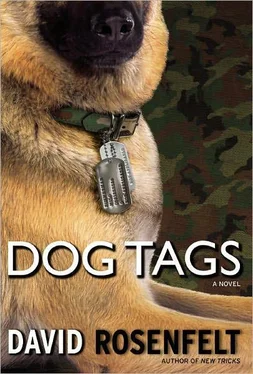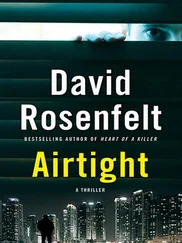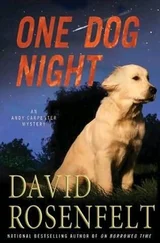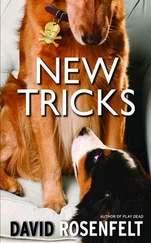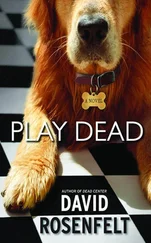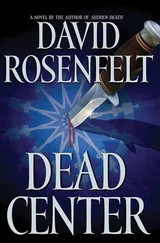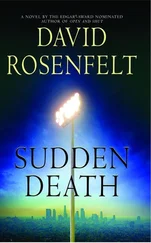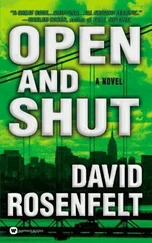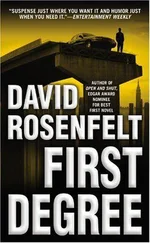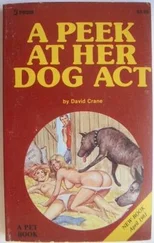He found it strange how much he enjoyed hunting, since he’d never particularly liked it growing up. But now it was something about the solitude; he could get lost in it and love doing so.
It was around eleven o’clock that Jeremy happened upon another hunter, a large but seemingly agreeable man, alone and dressed in orange hunting garb like Jeremy.
“Mornin’,” said Jeremy. “Any luck so far?”
The man grinned and held up a bag that was obviously empty. “Not a bit. But that’s okay; just being out here is enough for me.”
“I know what you mean.” He reached out his hand to shake. “Name’s Jeremy.”
“John. John Burney.”
Jeremy had no way of knowing, and no inclination to suspect, that the man was lying about his name. Even if the man had given his real name, Marvin Emerson, or his nickname, M, it would have meant nothing to Jeremy.
“You live around here, John?”
“Nope. Visiting friends, about ten miles outside Jackson Hole.”
“They don’t hunt?”
M laughed. “They’re from New York.”
M didn’t ask Jeremy where he lived, since he had already searched Jeremy’s cabin. In the process he found and took twenty-five thousand dollars in cash, which made it a rather profitable morning—almost worth coming out to the middle of nowhere.
Instead he asked gentle questions about Jeremy’s time in the army, claiming to have been a veteran himself. He wanted to assure himself that Jeremy was not the type to talk about his time in Iraq or what got him discharged.
Jeremy was tight-lipped about it, though he was willing to discuss his private life. After an hour, M felt reasonably certain that Jeremy had not revealed anything about the time in Iraq, and that there was no one he would have confided in.
It was just past noon, and M figured it was time to kill Jeremy. That would give him time to bury the body, get back to town, and get the last flight out.
He had decided to shoot Jeremy in the back. It wasn’t out of cowardice, though M was aware that as a former soldier Jeremy could be a worthy and dangerous adversary. It was basically unfair to Jeremy to do it from the front, and thereby have him experience the fear of knowing death was imminent. M didn’t want him to suffer; Jeremy had only been doing his job.
Just like M was now doing his.
He took out his handgun. He had equipped it with a silencer, more through force of habit and extra carefulness than anything else. Certainly the sound of a gunshot out here during hunting season would not attract attention.
But Jeremy turned around, possibly a result of instinct, possibly by happenstance. As soon as he saw the gun, he knew what was coming. And he knew why.
“You don’t have to do this,” Jeremy said.
“I’m afraid I do.”
M fired three times, though Jeremy was certainly dead from the first shot.
On the way to the airport he called Landon to report on the successful trip. “I’m on my way to Albuquerque now for number three.”
“Have you got somebody back here you can rely on?” Landon asked.
“Of course. What do you need?”
Landon had been disconcerted by the amount of press coverage Milo was getting, and that morning’s paper had carried the news that Andy Carpenter had signed on to represent Zimmerman. Publicity was not in any way desirable; before long the entire world would be looking for the dog, and maybe the envelope.
“I want the dog,” Landon said.
“Now?” M asked. “I thought you wanted to wait.”
“I’m finished waiting. Get me the dog now.”
CHAPTER 28
IF WE EVER LOSE OUR DEMOCRATIC, PERSONAL FREEDOMS, DISCOVERY WILL BE AMONG THE FIRST THINGS TO GO. For someone accused of a crime, I consider it among the most important rights. To tell you the truth, it makes Miranda look like an aging flamenco dancer.
Discovery is the process by which the prosecutor is forced to share the evidence he has, and that he will rely upon at trial, with the defense. It takes away the element of surprise and allows often underfunded defense attorneys to properly prepare their cases.
The discovery documents Eli sends us in the Zimmerman case are limited in scope. That’s not to say they’re not substantial, because they are. They include all the direct evidence against Billy, including very damaging forensics and eyewitness accounts. It is no wonder that Eli has no desire to offer a deal; he must correctly assume that his case is overwhelming.
But what the documents don’t include is background information on Erskine, or any information about the envelope or its possible contents. That is for the defense to probe; the prosecution does not need to dig out those facts to prove its case.
While there is no necessity for the prosecution to prove motive, I’m sure Eli will tell the jury that Billy was seeking revenge against Erskine, blaming him for his devastating injury. Eli will not go near any possibility that Erskine was corrupt, or that other people might have had reason to kill him. That is our job.
I ask Hike to prepare a request for information related to the bombing in Iraq. We could present it to the Defense Department, which would likely take forever to give it to us. Rather than go that route, I’ll ask the court to issue an order that it be provided.
I call Eli and ask that he stipulate no objection to our getting the information. He agrees to do so, not because he wants to be helpful, but because he knows we’ll eventually get it anyway. This way he avoids the possibility that it could lead to a delay in the court proceedings. Except for acquittals and hung juries, delays are the things prosecutors hate most in the world.
Hike and I spend three hours going over the discovery material, exchanging documents after we’ve read them so that we’ll each be sure to see all of it. This is just the beginning; we’ll be reviewing these same documents many times, in addition to others that are sure to follow. There is absolutely no excuse for a lawyer not to be totally knowledgeable about every aspect of the case. If there were I would have found it long ago.
Spending three hours with Hike reminds me of a scene from Take the Money and Run, one of Woody Allen’s earliest and funniest movies. Woody plays Virgil Tibbs, a small-time criminal who unsuccessfully attempts to escape from prison. As punishment, he is locked in a small, underground room with an insurance salesman, who shakes his hand and starts trying to sell him various policies before they are even locked away.
Hike has no interest in selling me insurance, but he has the unerring ability to focus on all that is wrong with the world, combining it with the certain knowledge that nothing can be done to fix it.
“This is not good,” Hike says when we are about to wrap it up for the night.
I nod. “Not so far.”
“You going to recommend he plead it out?”
“Eli already turned me down when I brought it up. I don’t think our client would go for it anyway.”
Hike frowns. “He’s an ex-cop; he must know what he’s up against.”
“He does.”
“You think he did it?”
“No. If he hated Erskine enough to kill him, he wouldn’t have done it this way.”
“Why not?” Hike asks.
“Because it put Milo in danger, and there would have been no reason to. He could have left Milo home, followed Erskine to the club, or anywhere else, and shot him. And if he wanted the envelope, he could have just taken it.”
“No jury is going to buy the he-wouldn’t-put-his-dog-in-danger argument. Unless you get twelve dog nuts like you.”
I nod. “The good news is, there are a lot of dog nuts out there.”
He smiles. “I’ll research if we can challenge a juror for cause based on the fact that he’s sane as it relates to dogs.”
Читать дальше
